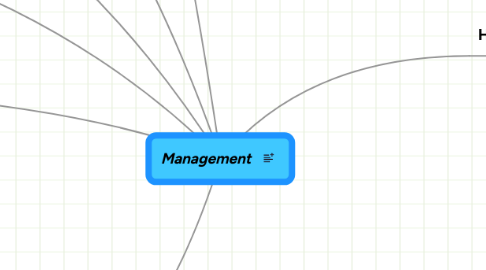
1. Roles
1.1. Interpersonal
1.1.1. Figurehead
1.1.1.1. duties legal/social nature
1.1.2. Leader
1.1.2.1. builds relationships, communicates, motivates, coaches
1.1.3. Liason
1.1.3.1. networks
1.2. Informational
1.2.1. Monitor
1.2.1.1. internal/external information
1.2.2. Disseminator
1.2.2.1. transmits information internal/external
1.2.3. Spokesperson
1.2.3.1. transmits information to outsiders
1.3. Decisional
1.3.1. Entrepreneur
1.3.1.1. initiator, designer, encourager, innovation
1.3.2. Disturbance handler
1.3.2.1. corrective action
1.3.3. Resource allocator
1.3.3.1. distributes resources
1.3.4. Negotiator
1.3.4.1. represents organisation in negotiations
2. Skills
2.1. Human
2.1.1. work well with others
2.2. Technical
2.2.1. understanding and proficiency in specialised field
2.3. Conceptual
2.3.1. visualising whole organisation, relationships between organisational parts, understanding community and global context
3. Work Methods
3.1. Unrelenting pace
3.2. Brevity, variety, fragmentation
3.3. Verbal Contacts and networks
4. Four Functions
4.1. Planning
4.1.1. goal setting
4.2. Organising
4.2.1. alllocating resources
4.3. Leading
4.3.1. influencing
4.4. Controlling
4.4.1. regulates activity
5. Performance
5.1. Effectiveness
5.1.1. choosing appropriate goals and achieving them
5.2. Efficiency
5.2.1. decrease resources and time needed to increase output/service
6. Hierarchical
6.1. Vertical
6.1.1. Top
6.1.1.1. Functions
6.1.1.1.1. Organising
6.1.1.1.2. Planning
6.1.1.1.3. Controlling
6.1.1.2. Skills
6.1.1.2.1. Conceptual
6.1.1.2.2. Human
6.1.2. Middle
6.1.2.1. Functions
6.1.2.1.1. Organising
6.1.2.1.2. Controlling
6.1.2.2. Skills
6.1.2.2.1. Technical
6.1.2.2.2. Human
6.1.3. Bottom
6.1.3.1. Functions
6.1.3.1.1. Leading
6.1.3.1.2. Controlling
6.1.3.2. Skills
6.1.3.2.1. Technical
6.1.3.2.2. Human
6.2. Horizontal
6.2.1. Functional
6.2.1.1. specific area
6.2.2. General
6.2.2.1. whole organisation/substantial
6.2.3. Project
6.2.3.1. co-ordinate people on particular project
7. History
7.1. Pre-classical
7.1.1. Robert Owen
7.1.1.1. working and living conditions
7.1.2. Charles Baggage
7.1.2.1. prototype modern computers, predicted specialisation of mental work, suggested profit sharing
7.1.3. Henry Towne
7.1.3.1. management as a science called for development of principles
7.2. Classical
7.2.1. Scientific
7.2.1.1. Fredrick Taylor
7.2.1.1.1. Increase efficiency by scientific study of work
7.2.1.2. Frank and Lillian Gilbreths
7.2.1.2.1. Motion Study
7.2.2. Beareaucratic
7.2.2.1. Max Weber
7.2.2.1.1. organisaitons need to operate rationally
7.2.3. Administrative
7.2.3.1. Henri Fayol
7.2.3.1.1. co-ordianating organisaitons internal activities
7.2.3.2. Chester Barnard
7.2.3.2.1. Acceptance theory of authority
7.3. Behavioural
7.3.1. Mary Parker-Follet
7.3.1.1. Link between scientific management and the social person era
7.3.2. Elton Mayo
7.3.2.1. organisations as social systems
7.3.2.1.1. Hawthorne Studies
7.4. Human Relations Movement
7.4.1. Douglas McGregor
7.4.1.1. Motivations
7.4.1.1.1. Theory X and Theory Y
7.4.2. Abraham Maslow
7.4.2.1. Maslow's Hierachy of Needs
7.4.2.1.1. Self-actualisation
7.4.2.1.2. Esteem
7.4.2.1.3. Social
7.4.2.1.4. Safety
7.4.2.1.5. Physiological
7.5. Quantitative
7.5.1. Management Science
7.5.1.1. used mathematical models and statistical models to increase effectiveness of decisions
7.5.2. Operations management
7.5.2.1. managing the production and delivery of products and services
7.5.3. Management information systems
7.5.3.1. designing/implementing computer based management information systems - convert raw data to information for many management levels
7.6. Contemporary
7.6.1. Systems theory
7.6.1.1. view organisations as systems
7.6.2. Contigency
7.6.2.1. appropriate managerial action depends on situational parameters
7.6.3. Total Quality Management (TQM)
7.6.3.1. Idea from US pioneered in Japan
7.6.3.1.1. improving product and service quality so as to achieve high levels of customer satisfaction/customer loyalty
7.6.4. Knowledge management and the "learning" organisation
7.6.4.1. Seeks competitive advantage by doing what is needed to make the most of an organisations knowledge resources
